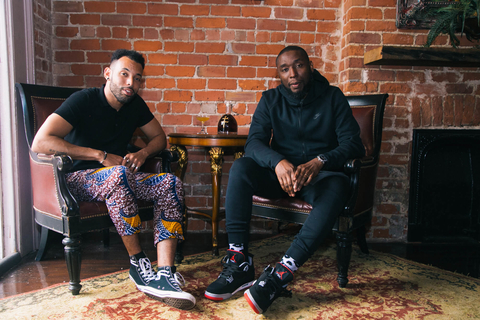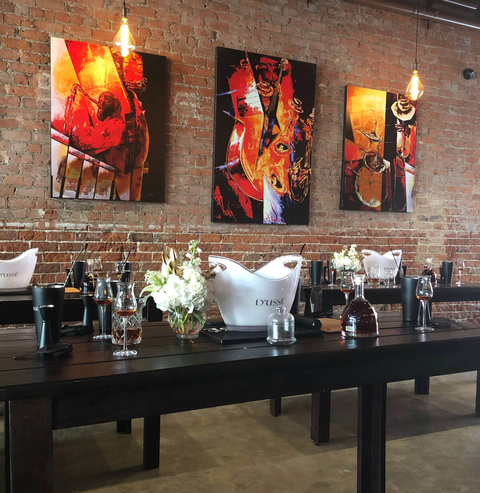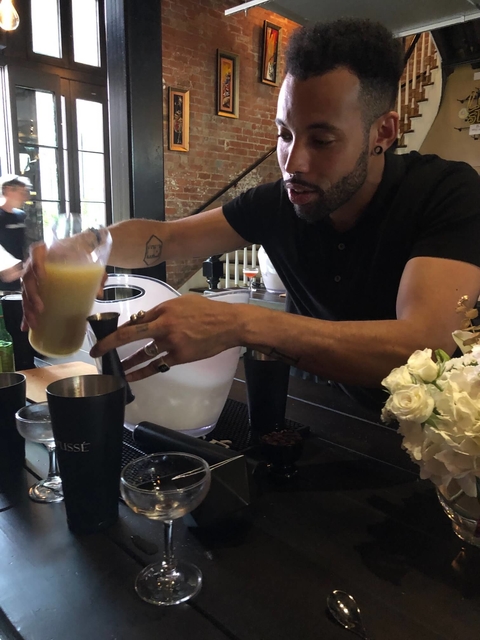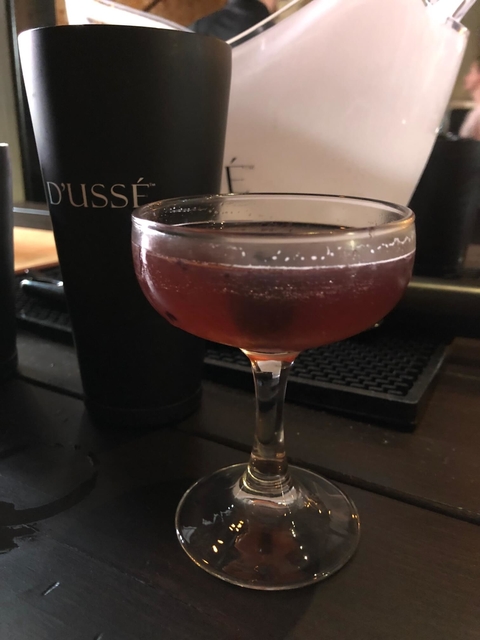Music, bars, restaurants and cocktails are inextricably enmeshed, but not only for the most obvious reason.
Unless you’ve built out and are operating the world’s most obsessively detailed library-themed bar, one that strictly adheres to its source material, you know the crucial role music plays in this business.
But have you considered how music and cocktail creation are related?
Around this time last year, we spoke with Ned Duggan, vice president of BACARDÍ, about the importance of music and menu programming. BACARDÍ has been studying the effects of music on drink orders and the guest experience for many years. Anyone who has been to a Live Nation event knows how committed BACARDÍ is to music, artists and creating memorable experiences.
And around this time for the past few years, a brand within the BACARDÍ portfolio has hosted an event that shines a spotlight on the relationship between our industry and music. That brand is D’USSÉ and the event is the D’USSÉ Re-Mixer Series.
This year, the event was made all the more special by the presence of Sullivan Doh, D’USSÉ’s first-ever global brand ambassador. BACARDÍ Senior portfolio ambassador and revered educator Colin Asare-Appiah had been the charismatic host for the Re-Mixer in the past, standing in until a suitable ambassador could be found to fill the role.
Check this out: The Sound of Cocktails: The Importance of Music & Menu Programming
Doh partnered with Grammy Award-winning producer and college professor 9th Wonder to explain the parallels that exist between cocktail mixing and song remixing. 9th Wonder, born Patrick Douthit, is a professor at Duke University and North Carolina Central University, and has also educated students at Harvard University, University of Pennsylvania, and University of Virginia. I’d say he’s forgotten more about music than most will ever know, but his knowledge and passion for the subject tells me he retains it all.
Just like Cognac, Doh is a French native who has helped develop prestigious bar programs in Paris, London and other cities across the globe. In 2016, Doh’s passion for French spirits, hospitality and mixology earned him a spot on the Forbes 30 Under 30 list. He co-founded and operated the first cocktail bar in Paris to use only French spirits, liqueurs and other alcohol—Le Syndicat Paris—and then brought that concept to another venue in Paris, La Commune.

In much the same way that Cognac, Cointreau and lemon juice come together beautifully to build a Sidecar, Doh and 9th Wonder pair wonderfully to explain how aspects of making new drinks and making new songs are alike. In fact, Doh used the Sidecar to drive that point home.
First, however, 9th Wonder manned a laptop and two turntables outfitted to use Serrato, music production software and hardware that allows DJs and producers to carry thousands of songs without lugging around crates upon crates full of records. On the second floor of the Bourbon Street Drinkery, opened in the historic (and infamous) French Quarter in New Orleans in 2017, he played an assortment of classic songs across multiple genres. 9th then played more recent songs (think ‘90s hip-hop and later) that sampled the classics he had been playing.
The Wonder—and he is that, truly—explained how song sampling changed things, how a knowledge of the classics and a passion to create something new with them as the foundation ushered in a new era. Artists across several genres of music have embraced sampling, paying homage to the classics while at the same time giving the world something new.
Check this out: 7 Questions to Ask Your Music Service Provider
For example, 9th Wonder played a portion of Screamin’ Jay Hawkin‘s “I Put a Spell on You,” first released in 1956 and one of The Rock & Roll Hall of Fame's 500 Songs that Shaped Rock and Roll—a true classic. He then dropped The Notorious B.I.G.’s “Kick in the Door,” which samples Hawkin’s song heavily. It’s a real-world example of a new artist (at the time) building something new using a classic, and that new work later becoming a classic itself.
9th Wonder’s point was that classics can be used as a starting point for innovation. With a deep understanding of the subject matter, thirst for knowledge, and passion to innovate, someone can create something new that references the old. Knowledge is the crucial element that helps make this process work.
When someone tells 9th Wonder that they want to be a music producer, he says great—and then tells them they have to listen to the classic albums within every genre of music. Want to be a hip-hop producer? 9th may hand you a Beatles record and tell you to study it. Why? Because without an in-depth knowledge of the subject material—music, in this case—what you produce will be one-dimensional, glaringly obviously so.
The same can be said for cocktail creation. While there’s something to be said for natural talent, the best bartenders have developed a strong foundation; their drink building skills are rooted in classic techniques, their cocktail knowledge is rooted in the classics, and their service skills are rooted in hospitality basics.
Encouraging your bartenders to hone their craft will help you build a team of rock stars who understand that you’re interested in their careers and longevity in the industry. That understanding can help improve employee retention, reducing costs and building an increasingly engaged pool of regular guests. One of the ways you can help your bartenders strengthen their foundations is to test and train them on classic cocktails: Margarita, Daiquiri, Martini, Manhattan, Old Fashioned, Negroni, Sidecar…
Check this out: How to Prevent Music Licensing from Crushing Owners & Operators
When you’re confident your bar team has the classics down (or that they’re getting close), encourage them to riff and create new drinks for your cocktail menu. Variants of classics can ease less adventurous guests into trying new signature drinks without straying too far from their comfort zone. This can help your bar team introduce guests to new spirits, new techniques, and new presentations. That type of engagement keeps guests coming back to your bar.

This is where the aforementioned Sidecar comes in. After 9th explained the parallels between mixing drinks and remixing songs, Doh took charge of the main bar at the Bourbon Street Drinkery. Tables had been outfitted with cutting boards, bar tools, D’USSÉ VSOP, orange liqueur, lemon juice, and a couple aromatic elements of VSOP. A large assortment of additional ingredients was made available to all those participating in the Re-Mixer.
We had been given the opportunity to taste a traditional Sidecar, and now we were encouraged to create our own variants. Doh would be tasting them, so the pressure was on. For the Nightclub & Bar riff I muddled blackberries before adding equal parts D’USSÉ VSOP, orange liqueur, and coconut water. Yes, I had forgotten to add lemon juice. In fact, in the interest of transparency, I had mistaken a carafe of coconut water for lemon juice.
When Doh tasted the unbalanced Sidecar riff—which I suppose I could have claimed was an intentional Sidecar Sbagliato—he immediately identified my mistake. Years of honing his craft, anchored presumably in classics, meant that Doh could put his finger on what was wrong with my Sidecar after just one small sip. Not only that, but his strong foundation helped him identify and suggest and immediate fix. Relating this back to music, I hadn’t blended the classic and new elements correctly and my “remix” wasn’t working.

I remade the drink, with Doh stepping in to add an equal part of lemon juice to the Cognac, orange liqueur and coconut water. Perhaps Doh was just being nice and encouraging, but he smiled and said he liked it. So, for those of you who’d like to try the Nightclub & Bar Sidecar, the recipe is below.
So, grab your bar team, pump their favorite songs through your bar's sound system, and get their creative cocktail juices flowing. Oh, and I’m calling dibs on a silent library-themed bar now, just in case.

Nightclub & Bar Sidecar
Image by Jessica Deibel
- 1 part D’USSÉ VSOP
- 1 part Orange liqueur (Cointreau for tradition)
- 1 part Lemon juice
- 1 part Coconut water
- 2 Blackberries to muddle
- 1 Blackberry to garnish
Muddle the blackberries in a shaker. Add the Cognac, orange liqueur, lemon juice and coconut water. Fill the shaker with ice. Shake and strain into a coupe. Garnish with a blackberry.
